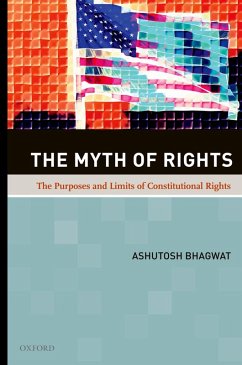What is a constitutional right? If asked, most Americans would say that it is an entitlement to act as one pleases - i.e., that rights protect autonomy. That understanding, however, is wrong; it is, indeed,
The Myth of Rights. The primary purpose and effect of constitutional rights in our society is structural. These rights restrain governmental power in order to maintain a balance between citizens and the State, and an appropriately limited role for the State in our society. Of course, restricting governmental power does have the effect of advancing individual autonomy, but that is not the primary purpose of rights, and furthermore, constitutional rights protect individual autonomy to a far lesser degree that is generally believed. Professor Bhagwat brings clarity to many difficult controversies with a structural approach towards constitutional rights. Issues discussed include flag-burning, the ongoing debates over affirmative action and same-sex marriage, and the great battles over executive power fought during the second Bush Administration.
The Myth of Rights addresses the constitutional issues posed in these and many other areas of law and public policy, and explains why a structural approach to constitutional rights illuminates these disputes in ways that an autonomy-based approach cannot. Readers will understand that while constitutional rights play a critical role in our legal and political system, it is a very different role from what is commonly assumed.
Dieser Download kann aus rechtlichen Gründen nur mit Rechnungsadresse in A, B, BG, CY, CZ, D, DK, EW, E, FIN, F, GR, HR, H, IRL, I, LT, L, LR, M, NL, PL, P, R, S, SLO, SK ausgeliefert werden.


